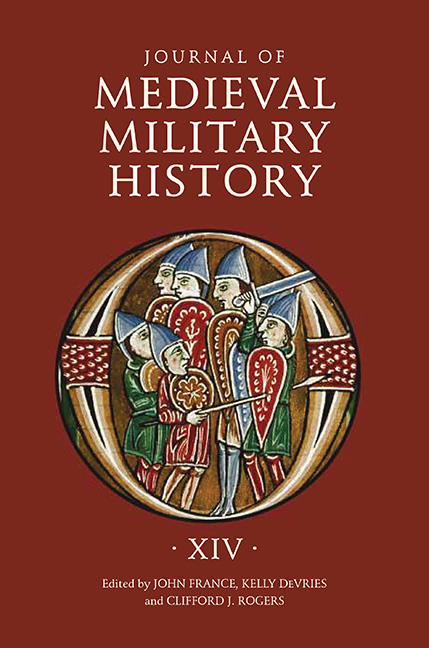Book contents
- Frontmatter
- Contents
- 1 Anglo-Norman Artillery in Narrative Histories, from the Reign of William I to the Minority of Henry III
- 2 Imperial Policy and Military Practice in the Plantagenet Dominions, c. 1337–c. 1453
- 3 The Parliament of the Crown of Aragon as Military Financier in the War of the Two Pedros
- 4 Chasing the Chimera in Spain: Edmund of Langley in Iberia, 1381/82
- 5 Note: A Medieval City under Threat Turns Its Coat, while Hedging Its Bets – Burgos Faces an Invasion in Spring 1366: Introduction and Translation
- 6 Medieval European Mercenaries in North Africa: The Value of Difference
- 7 Medieval Irregular Warfare, c. 1000–1300
- 8 Muslim Responses to Western Intervention: A Comparative Study of the Crusades and Post-2003 Iraq
- 9 “New Wars” and Medieval Warfare: Some Terminological Considerations
- 10 Friend or Foe? The Catalan Company as Proxy Actors in the Aegean and Asia Minor Vacuum
- List of Contributors
- Journal of Medieval Military History
- De Re Militari and the Journal of Medieval Military History
6 - Medieval European Mercenaries in North Africa: The Value of Difference
Published online by Cambridge University Press: 12 September 2017
- Frontmatter
- Contents
- 1 Anglo-Norman Artillery in Narrative Histories, from the Reign of William I to the Minority of Henry III
- 2 Imperial Policy and Military Practice in the Plantagenet Dominions, c. 1337–c. 1453
- 3 The Parliament of the Crown of Aragon as Military Financier in the War of the Two Pedros
- 4 Chasing the Chimera in Spain: Edmund of Langley in Iberia, 1381/82
- 5 Note: A Medieval City under Threat Turns Its Coat, while Hedging Its Bets – Burgos Faces an Invasion in Spring 1366: Introduction and Translation
- 6 Medieval European Mercenaries in North Africa: The Value of Difference
- 7 Medieval Irregular Warfare, c. 1000–1300
- 8 Muslim Responses to Western Intervention: A Comparative Study of the Crusades and Post-2003 Iraq
- 9 “New Wars” and Medieval Warfare: Some Terminological Considerations
- 10 Friend or Foe? The Catalan Company as Proxy Actors in the Aegean and Asia Minor Vacuum
- List of Contributors
- Journal of Medieval Military History
- De Re Militari and the Journal of Medieval Military History
Summary
President Obama does not demand a Muslim-only Secret Service, nor does President Rouhani of Iran insist upon an exclusively Christian bodyguard. During the medieval and early modern periods, however, Muslim and Christian rulers regularly hired mercenary guards of each other's faith to defend their persons and strengthen their armies. In a time famous for its religious antagonism, these mercenary bands crossed a confessional divide, spread through the Mediterranean, and carved out a presence for themselves in their host societies, sometimes for centuries. While they often fought against members of different faiths, they sometimes took up arms against their co-religionists as well. Even so, they usually operated with the consent of their own religious and political authorities.
Though employing foreign soldiers was commonplace throughout the medieval Mediterranean world, it was especially popular in North Africa. Here dynasties large and small, from the mighty Almoravid and Almohad Empires to the successor dynasties of the Hafsids in Tunisia, the ‘Abd al-Wadids in Algeria, and the Marinids in Morocco, hired European Christian fighters in impressive numbers. As they worked, raised families, and reproduced themselves over the centuries, these mercenaries came to occupy a key role in North African political and social life. They decided the course of battles, propped up and toppled dynasties, served as intermediaries in inter-religious diplomacy, and created a fascinating hybrid lifestyle that combined elements from their natal and adopted homelands.
Although scholars have noted the importance of European mercenaries to western Mediterranean history, little attempt has been made to explain their enduring appeal to the North African regimes that employed them. What few contemporary analyses there are have tended to focus on a technical military argument that was first put forward by Ibn Khaldun in the fourteenth century.
The great North African thinker suggested that local rulers valued heavily armed mounted European knights for their ability to hold the line on the battlefield. By setting a defensive screen in front of the ruler, the European knights enabled their more lightly armed and speedier local counterparts to launch the rapid attacks and feigned retreats that were the hallmarks of their style. What the European fighters offered, in other words, was diversification. They added a distinct but complementary element to a Maghribi ruler's tactical array in combat.
- Type
- Chapter
- Information
- Journal of Medieval Military HistoryVolume XIV, pp. 105 - 122Publisher: Boydell & BrewerPrint publication year: 2016

